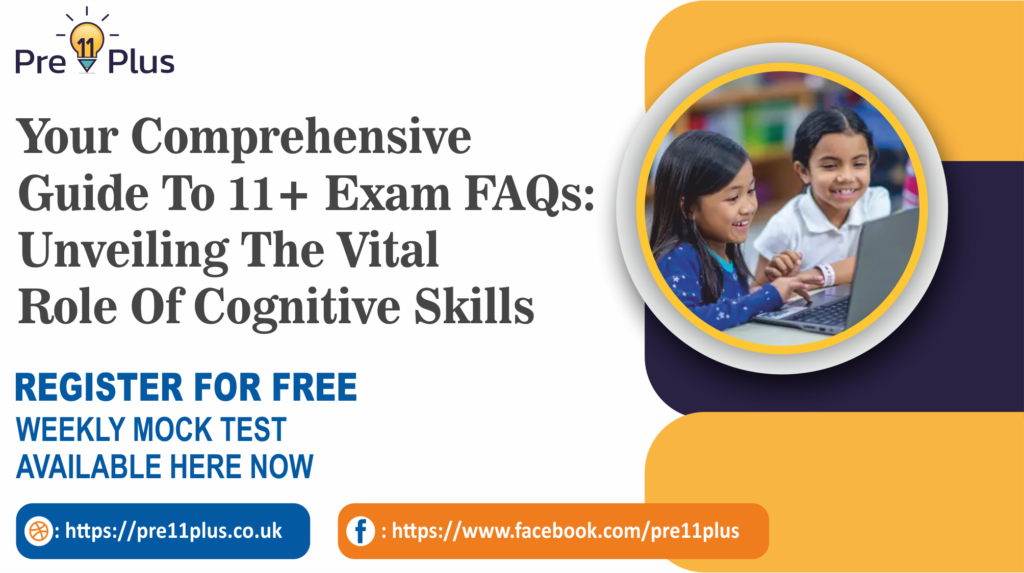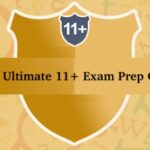Your Comprehensive Guide to 11+ Exam FAQs: Unveiling the Vital Role of Cognitive Skills
The 11+ exam is a pivotal milestone in the educational journey of UK students, and comprehending the significance of cognitive skills is paramount for achieving success. In this in-depth guide, we will delve into frequently asked questions (FAQs) surrounding the 11+ exam, with a particular emphasis on the critical role that cognitive skills play. By unraveling these questions, students and parents will gain profound insights into how cognitive skills are essential for excelling in this competitive examination.
FAQ 1: What Is the 11+ Exam?
The 11+ exam, also known as the Eleven-Plus, is a selective entrance examination taken by students in their final year of primary school in the UK. It evaluates their aptitude in subjects such as Mathematics, English, Verbal Reasoning, and Non-Verbal Reasoning. The exam results determine eligibility for admission to grammar schools and other selective institutions.
FAQ 2: What Are Cognitive Skills, and Why Are They Crucial for the 11+ Exam?
Cognitive skills, often referred to as thinking skills or intellectual abilities, are the mental processes that empower individuals to acquire knowledge, solve complex problems, make informed decisions, and comprehend intricate concepts. These skills are of paramount importance in the 11+ exam because they form the foundation of a student’s ability to excel in subjects such as Mathematics, English, Verbal Reasoning, and Non-Verbal Reasoning.
The realm of cognitive skills encompasses a broad spectrum of abilities, including:
Critical Thinking:
The capacity to analyze information objectively, evaluate arguments, and formulate reasoned judgments.
Problem Solving:
The ability to identify challenges, develop effective solutions, and implement problem-solving strategies efficiently.
Logical Reasoning:
The skill of drawing valid conclusions from available information, often employing deductive and inductive reasoning.
Memory:
The capability to retain and recall information, a cornerstone for factual knowledge acquisition and vocabulary expansion.
Attention and Concentration:
The aptitude to maintain focused attention on tasks, sustain concentration, and sidestep distractions, all of which are indispensable during the exam.
These cognitive skills are not solely instrumental in answering questions accurately but also in managing time effectively and approaching the exam with unwavering self-assurance.
FAQ 3: How Can Students Enhance Their Cognitive Skills for the 11+ Exam?
Augmenting cognitive skills is a multifaceted endeavor that encompasses a blend of academic and practical strategies:
Practice and Revision:
Consistent practice with past papers and sample questions serves as a crucible for honing cognitive skills. It cultivates problem-solving prowess, logical reasoning, and memory retention through recurrent engagement.
Critical Reading:
Encourage students to engage with challenging texts and materials that demand critical thinking. This engagement sharpens their cognitive skills as they dissect and assess information critically.
Puzzles and Brain Games:
Engaging in activities like Sudoku, crossword puzzles, and brain-training games adds an enjoyable dimension to cognitive skill enhancement. These activities foster logical reasoning and improve attention.
Time Management:
Acquiring proficient time management skills is paramount. Students should learn to allocate time judiciously to various sections of the exam, ensuring that they complete all questions within the stipulated time frame.
Mindfulness and Stress Reduction:
Stress can impair cognitive function. Employing mindfulness techniques, relaxation exercises, and ensuring adequate sleep are effective ways to reduce stress, allowing cognitive skills to flourish during the exam.
Healthy Lifestyle:
Maintaining a balanced lifestyle that includes proper nutrition, hydration, regular physical activity, and sufficient sleep is pivotal in supporting overall cognitive health. Encourage students to uphold these practices.
FAQ 4: Are Cognitive Skills the Sole Determinants of Success in the 11+ Exam?
While cognitive skills are undoubtedly central, success in the 11+ exam is an amalgamation of diverse factors. These factors encompass the student’s work ethic, study habits, access to educational resources, the quality of their preparation, and the level of support provided by parents and teachers. Moreover, cultivating a positive attitude, demonstrating resilience, and employing effective exam strategies also wield significant influence.
Conclusion :
Cognitive skills stand as the bedrock of success in the 11+ exam. They form the cornerstone of a student’s ability to excel in 11+ subjects. It is imperative to acknowledge that a holistic approach to preparation, which includes cultivating effective study habits, mastering time management, prioritizing well-being, and others collectively contributes success in this competitive examination.
why not try www.pre11plus.co.uk. – Intuitive & Predictive Learning Platform
join pre11plus whatsapp group for regular updates – pre11plus
Pre11Plus – Nurturing Individual Excellence in Every Learner












